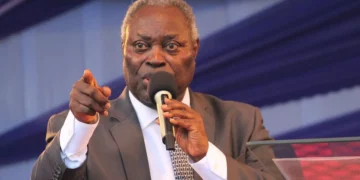The House of Representatives recently set up a Committee to investigate the National Hajj Committee of Nigeria (NAHCON). Today, I share some of the points I made during my submission at the Public Hearing. Enjoy
Introduction
This presentation addresses the operational inefficiencies and challenges faced by the National Hajj Commission of Nigeria (NAHCON) and its designated service provider, Ithraa Al Khair, during the Hajj 2024 season. This year’s pilgrimage has brought to light significant gaps in service provision, exacerbated by previous years’ experiences, culminating in a pressing need for comprehensive reform within the structure of Hajj operations administered by NAHCON.
Travellers’ experience during Hajj is critical; the pilgrimage management must involve qualified individuals who thoroughly understand the complexities of Hajj operations. The appointment of personnel to the Hajj Commission must prioritise expertise over familial or political connections to ensure professionalism and efficiency.
The 2024 Hajj season was marked by significant challenges stemming from the management of accommodations for Nigerian pilgrims, particularly concerning the operations of the National Hajj Commission of Nigeria (NAHCON) and their chosen service provider, Ithraa Al Khair. Fundamental changes in the Hajj process, notably eliminating upgrade options for A Tent accommodations, had profound implications that many pilgrims and Private Tour Operators (PTOs) were unprepared for.
Background
The relationship between PTOs and Mal Jalal, former Chairman of NAHCON, was professional but strained, primarily due to previous experiences with inadequate service from their appointed Mu’assasah, Ithraa Al Khair. PTOs had been vocal about their dissatisfaction and sought Mal Jalal’s support to secure better service options. Encouraged by his assurances that they could seek improved service providers, PTOs engaged with different companies as potential alternatives for Hajj services.
The build-up to Hajj 2024
As the discussions evolved, PTOs felt a renewed hope for better arrangements. However, in January 2024, a document from NAHCON stated there would be no change in service provisions, alluding that Ithraa Al Khair would remain the designated provider despite widespread concern among operators. This decision by NAHCON sparked discontent, especially after a meeting on January 26, 2024, where PTOs were pressured to accept arrangements with Ithraa Al Khair, raising fears of coercion.
Deterioration in Service Quality
The subsequent elimination of flexible accommodations in the Mashaa’ir resulted in many pilgrims being assigned to less favourable D Tents, which needed more amenities and comfort. NAHCON had initially promised rooming flexibility, but due to complications in the e-Hajj Portal, pilgrims were left with no options but to accept the arrangements dictated by the Ministry of Hajj and Umrah.
As the deadline for visa processing approached, PTOs faced increasing pressure to issue visas to their pilgrims. The uncertainty surrounding tent assignments led to a chaotic situation that significantly affected the Hajj experience. The swift approach of the visa deadline forced PTOs to act without clarity on the accommodation arrangements, leading to a mismatch between what pilgrims paid for and what they received.
The Complication of Tent Assignments
Working with Ithraa Al Khair, my company was tasked with creating a rooming list for eight special tents intended to accommodate a select group of 192 pilgrims who each paid exorbitantly high fees (SAR 20,000 per head). The planning process was marked by exhaustion and high pressure, where continuous changes were made based on demands from both NAHCON and state officials. As a result, the operational efforts to accommodate pilgrims became increasingly strained.
With the chaos at the A Tents, many pilgrims who had paid for A Tent accommodations ended up in D Tents due to Ithraa Al Khair’s limitations and mismanagement. This overcrowding resulted in inadequate facilities for all who were placed there.
Arafah as a Silver Lining
The Day of Arafah contrasted the previous chaos, with Ithraa Al Khair providing satisfactory conditions for the group of pilgrims assigned to a well-furnished one-storey building with central cooling and proper amenities. Feedback during this period was largely positive, offering a much-needed respite in an otherwise tumultuous Hajj experience.
In the aftermath of these events, it became clear that no future leadership of NAHCON could succeed if Ithraa Al Khair remained the service provider. Their continuous poor performance and avoidance of accountability indicated a deeper systemic issue within the Hajj service framework. Despite their track record, Ithraa Al Khair has avoided repercussions, demonstrating that NAHCON must reconsider its partnerships.
I recommend that NAHCON consider diversifying its service providers for D Tent accommodations, allowing competition among at least three different companies. Increased competition could foster improved standards and ensure Nigerian pilgrims receive the quality of service they expect and deserve. Furthermore, NAHCON should establish a Think Tank comprising former leaders (chairmen of the Commission), permanent commissioners in critical operational areas and former chief executives of state pilgrims’ boards to guide current decisions and enable more efficient management of Hajj affairs.
General Observations and Recommendations
It is recommended that Section 3 of the NAHCON Establishment Act be amended to include representatives from travel agencies, such as tour operators and state pilgrims welfare agencies, on the NAHCON Board. These agencies play a vital role in the Hajj process, generating 100% of the pilgrims and accompanying revenue. Their exclusion from the Board undermines the collaborative potential necessary for effective governance and decision-making within the Commission.
Incorporating travel agency representatives would not only acknowledge their significant contributions but also enhance NAHCON’s ability to address the needs and concerns of all stakeholders involved in the pilgrimage. This amendment ensures that the insights and experiences of those directly involved in pilgrimage logistics are integrated into the planning and execution process, ultimately benefiting Nigerian pilgrims and strengthening the overall Hajj experience.
The NAHCON Act currently lacks a clear definition of “Tour Operator,” opting instead to use the term “Agency,” which encompasses various state-level Pilgrims Welfare Boards and licensed agencies. This lack of specificity can create confusion regarding the roles and responsibilities of tour operators in the Hajj process. Clarity can be provided by explicitly recognising “Tour Operators” within the Act, ensuring their essential pilgrimage contributions are acknowledged. Therefore, Section 16 should be amended to include a distinct definition of “Tour Operator” as follows:
“Tour Operator” refers to any licensed agency or organisation that facilitates and organises pilgrimage services for individuals or groups,..…
This revision would ensure that the role of tour operators is prominently recognised and afforded the importance it deserves within the legal framework governing Hajj operations.
Recruitment Process
The recruitment process for leadership positions within the Hajj Commission should involve only individuals with a solid understanding of Hajj operations. Those in charge must be knowledgeable about the complexities of the pilgrimage. Additionally, there should be efforts to reduce family influence in the decision-making process to ensure professionalism and effectiveness in managing Hajj affairs.
To be continued…
Practical Implementation of the NAHCON Act
Priority should be given to the effective implementation of the existing Act rather than pursuing amendments (the above suggestions notwithstanding). The current issues facing the commission stem from inadequate execution of the provisions within the Act, many of which have yet to be tested in actual Hajj operations. Instead of seeking changes to the law, let this august House focus on addressing operational shortcomings, such as managing the Hajj Savings Scheme, which currently lacks a Board of Trustees and should be administered by the State Pilgrims’ Boards and agencies and not NAHCON.
Furthermore, NAHCON should take on the critical role of licensing industry participants, including state boards and PTOs. By doing so, the commission can ensure a regulated and organised framework for all stakeholders involved in the pilgrimage, fostering better collaboration and ultimately enhancing the experience for all Nigerian pilgrims. This approach promotes accountability and effective governance within the Hajj operation, aligning with the Act’s original intent.
NAHCON should (1) enhance its regulatory oversight by implementing effective regulations and enforcement mechanisms. These regulations must be fair, consistent, predictable, and acceptable to all stakeholders involved in the Hajj process. Strengthening oversight in this way would ensure that all parties adhere to established standards, fostering trust and cooperation among stakeholders while improving the overall organisation and management of the pilgrimage. (2) concentrate on its primary responsibilities, which include formulating policies, regulating the Hajj process, providing consular services, overseeing health measures, and licensing relevant stakeholders. By focusing on these core functions, NAHCON can improve its effectiveness and efficiency in managing the Hajj pilgrimage, ensuring that all aspects are well-organised and compliant with established standards. This targeted approach would enhance the overall experience for pilgrims and uphold the integrity of the Hajj operations in Nigeria.
Hajj Fares
The lack of consistency in Hajj fares across different states raises concerns about fairness. Each state offers various accommodations in diverse locations with distinct benefits, such as proximity to the Haram and varying quality, which can influence pricing. NAHCON should not determine Hajj fares for states; instead, it should allow each state to set its own fares after obtaining approval from NAHCON. This approach would ensure that fees reflect local market conditions and the specific services each state offers, promoting greater transparency and equity in the Hajj pricing process.
Corruption
Corruption negatively impacts Nigerian pilgrims by inflating accommodation costs. For example, a hotel priced at SAR 5,000 may only be worth SAR 2,500, which is the actual amount paid. The remaining SAR 2,500 is often diverted among agents and other individuals with vested interests in the industry, leading to the financial exploitation of the pilgrims. This practice undermines the integrity of the Hajj experience and results in pilgrims overpaying for services that do not reflect their actual value.
The leadership of NAHCON should refrain from making unrealistic promises, such as guaranteeing a reduction in Hajj fares, to gain favour with authorities. Such statements can damage the integrity and credibility of Hajj management in Nigeria. Instead, NAHCON should focus on honest and practical policies that genuinely enhance the pilgrimage experience, thereby maintaining trust with pilgrims and stakeholders.
This investigation should not be confined to Hajj 2024; it has to focus on Hajj operations from recent years. The 2024 Hajj showed improvements over the Hajj in 2022 and 2023, which faced several issues. For instance, at Mashaa’ir, in Hajj 2022, half of the pilgrims did not receive accommodation, the food supply was insufficient, and the airlift was not fully completed, leaving a notable number of pilgrims behind during outbound flights. Addressing these past problems is essential for enhancing future Hajj operations.
Further Recommendations
- Service Provider Rotation: To ensure quality service, NAHCON should consider establishing a regular rotation of service providers for accommodations. This approach encourages competition among multiple companies and can significantly enhance the quality of services offered to pilgrims.
- Pilgrim Feedback Mechanism: Establishing a robust feedback mechanism to collect the views and experiences of pilgrims during and after the Hajj can assist NAHCON in identifying lapses and areas requiring improvement.
Transparency in Financial Management: NAHCON must prioritise transparency in its financial dealings, particularly in budget allocations and spending related to Hajj operations, to restore trust and faith among the Nigerian populace.
Conclusion
The Hajj 2024 experience highlights significant gaps in service provision and management by NAHCON and Ithraa Al Khair. The overriding need for improved service delivery, greater competition among service providers, and strategic oversight mechanisms stands clear. For future Hajj seasons, it is imperative that structures are put in place to prevent the recurrence of such organisational failures, ensuring that Nigerian pilgrims have their needs effectively met during this critical spiritual journey.
Multiple public hearings on Hajj issues have been held in the past, but the outcomes and recommendations were not communicated or acted upon. Therefore, the National Assembly (NASS) should assure us that the current investigation will lead to meaningful results and will not be a waste of time.





